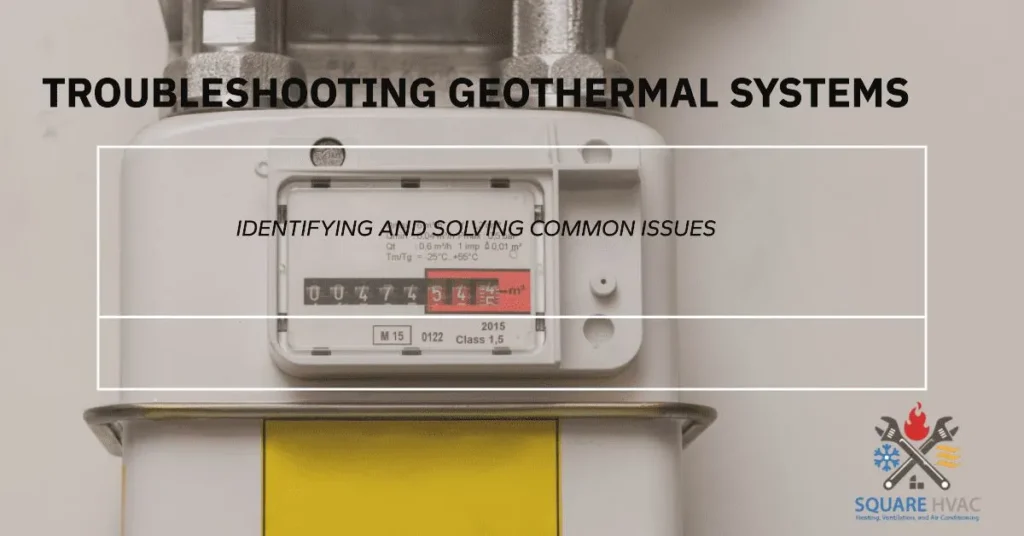Geothermal systems use Earth’s heat for eco-friendly HVAC in homes. Homeowners need to understand common issues with these systems to effectively troubleshoot problems and ensure optimal performance.
But the Question Here Arises ” What are the common problems with geothermal systems”.
We’ll address heating or cooling, loop, pump, electrical, control, and water issues. Get DIY solutions, and maintenance tips, and know when to seek professional help.
Common Problems with Geothermal Systems
Table of Contents
Toggle
Insufficient Heating/Cooling
Geothermal systems may lack heating or cooling, a common homeowner issue. This can be caused by factors such as low refrigerant levels or compressor issues. When these problems occur, it’s important to be aware of the symptoms and signs to look out for.
You might see less air, uneven temperature, or can’t reach the desired temp. To fix the issue, check the refrigerant and compressor for proper function.
Understanding and addressing these causes will help restore the optimal heating and cooling performance of your geothermal system.
Loop Problems
Leaking underground loops can be a problem in geothermal systems. These leaks can have a significant impact on the efficiency of the system. If not found and fixed early, leaks in the loop can cause reduced heating or cooling and higher energy use.
To find and fix leaks, you need special methods like pressure tests and thermal imaging. By addressing loop problems, you can ensure that your geothermal system operates at its full potential, providing efficient and reliable heating and cooling for your home.
Pump Malfunctions
Pump malfunctions are yet another common issue that can affect geothermal systems. When the pumps fail to operate correctly, it can have a direct impact on the performance of the system.
Diagnosing pump issues: check for odd noises, low flow, or unstable pressure levels. Once identified, you can fix or replace the pump to solve the issue.
To keep your geothermal system working well, it’s important to take good care of it. Regular maintenance, like cleaning and lubricating the system, can help prevent problems and keep things running.
Electrical and Control System Issues
Geothermal systems have electrical and control systems that are susceptible to problems. Common electrical issues might include blown fuses, tripped circuit breakers, or faulty wiring. These problems can disrupt the system’s operation and impact its performance.
Control system issues, but, can lead to improper functioning of components, such as valves or sensors, which can impact heating or cooling efficiency.
To fix electrical issues, check connections, replace damaged parts, or ask an expert. Fixing these issues will keep your geothermal system running.
Water Quality and Corrosion.
The water quality in a geothermal system is essential for it to work. Water that contains impurities or is corrosive can lead to various problems.
Corrosion-related issues can harm pipes, heat exchangers, and other system parts, which can lower system efficiency and lifespan. To avoid these problems, you can take preventive measures like installing water treatment systems or using corrosion inhibitors.
It’s also important to check the water quality and perform maintenance tasks like flushing the system. These steps will help prevent water-related issues and keep your geothermal system running for a long time.
DIY Solutions and Maintenance Tips
Step-by-step guide for homeowners to troubleshoot common issues
- If you’re experiencing insufficient heating or cooling, check the refrigerant levels and ensure the compressor is working properly.
- For loop problems, look out for signs of leaks, such as wet spots or reduced system efficiency. Consider professional assistance for specialized leak detection methods like pressure testing and thermal imaging.
- When encountering pump malfunctions, listen for unusual noises, check the flow rate, and ensure consistent pressure levels. Regular maintenance tasks like cleaning and lubrication can also help prevent pump issues.
Maintenance checklist to prevent problems with geothermal systems
Safety precautions
- Before performing any maintenance or troubleshooting tasks, ensure the system is turned off.
- Follow manufacturer guidelines and instructions.
- If you’re unsure or uncomfortable with any task, contact a professional technician.
Maintenance Tips
- Regularly clean or replace air filters to maintain proper airflow.
- Inspect and clean the outdoor unit to remove debris and ensure efficient operation.
- Check and adjust thermostat settings for optimal comfort and energy savings.
- Monitor water quality if you have an open-loop system, and consider installing water treatment systems to prevent corrosion.
- Flush the system periodically to remove sediment and maintain performance.
When to Seek Professional Help
Signs that you need professional assistance
- Persistent or recurring issues that DIY troubleshooting hasn’t resolved.
- Unusual noises, leaks, or other signs of system malfunction.
- Electrical problems, such as tripped breakers or faulty wiring.
- Water-related issues, like poor water quality or persistent corrosion.
Importance of timely repairs and maintenance
- Timely repairs can prevent small issues from turning into major problems.
- Regular maintenance by professionals ensures optimal system performance, extends lifespan, and maximizes energy efficiency.
- Professional technicians have the expertise and specialized tools to diagnose and resolve complex issues.
Tips for Preventing Future Problems
Regular maintenance schedule
- Create a maintenance calendar to remind yourself of routine tasks, such as filter replacements, cleaning, and system checks.
- Follow manufacturer guidelines for recommended maintenance intervals.
Importance of professional inspections
- Schedule regular professional inspections to detect and address potential issues before they become significant problems.
- Professionals can identify hidden issues, ensure proper system operation, and provide expert advice on system optimization.
Best practices for homeowners to extend system lifespan
- Keep the area around the outdoor unit clear of debris and vegetation.
- Protect the system from extreme weather conditions.
- Follow maintenance guidelines provided by the manufacturer and your technician.
- Stay proactive in addressing any signs of trouble to prevent further damage and maintain system efficiency.


